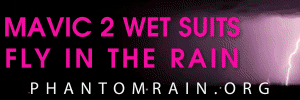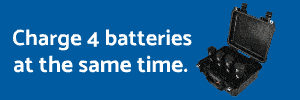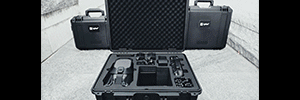You are using an out of date browser. It may not display this or other websites correctly.
You should upgrade or use an alternative browser.
You should upgrade or use an alternative browser.
Canada .... True North
- Thread starter jmminke
- Start date
Robert Prior
Well-Known Member
Registration is simple — takes 5 minutes and $5.
Passing the exam took more work. Not the drone regulations (they are pretty simple) but the general aviation stuff as the basic exam covered things that are irrelevant to a recreational drone pilot.
Best study guide I've found for the basic exam is this one from Don Joyce:
Passing the exam took more work. Not the drone regulations (they are pretty simple) but the general aviation stuff as the basic exam covered things that are irrelevant to a recreational drone pilot.
Best study guide I've found for the basic exam is this one from Don Joyce:
Hi Robert
You are right.........I am registered, Took the exam and passed thanks to Don Joyce study guide.
I agree the exam questions are not specific to basic drone material. Mine had numerous questions related to airplanes not drones.
You are right.........I am registered, Took the exam and passed thanks to Don Joyce study guide.
I agree the exam questions are not specific to basic drone material. Mine had numerous questions related to airplanes not drones.
Marty Markoe
Well-Known Member
Do you know if US residents qualify to take the Canada test?Well its official...... the start of new Transport Canada rules and regulations. June 1st. Must have your drone registered and must have a Drone Pilots Certificate/Licence to be legally able to fly.
Do you know if US residents qualify to take the Canada test?
No but if you have a drone licence issued in the U.S. then you must follow the below rules.
1. apply for a Special Flight Operations Certificate. (SFOC)" "Extra rules apply if you're a foreign operator (you are not Canadian and you fly in Canadian airspace). You must have an approved certificate to fly a drone for work or research " It appears Canada assumes if your not from Canada your not flying for recreation.
2. The SFOC requires non-Canadian citizens to go to an approved Canadian Flight School
3. Send the form and documents to the Civil Aviation regional office in the region where you intend to fly
The rules have become absolutely ridiculous. Rules don't get changed unless there is a push from some interest group.
Marty Markoe
Well-Known Member
You wrote, "It appears Canada assumes if your not from Canada your not flying for recreation."
Do think this means it's okay to fly recreationally?
Marty
Do think this means it's okay to fly recreationally?
Marty
You wrote, "It appears Canada assumes if your not from Canada your not flying for recreation."
Do think this means it's okay to fly recreationally?
Marty
No Marty ...... you will need to apply for a SFOC.
"If you are a foreign operator (that is, you are not a Canadian citizen, permanent resident or a corporation incorporated by or under federal or provincial and you want to fly in Canadian airspace), you must have an approved SFOC to fly a drone for any purpose (recreational, work or research)."
If your drone weighs under 250 grams you might be OK. They do not fall into the requirements for basic or advanced operations requiring a certificate licence.
Marty Markoe
Well-Known Member
Would be nice if FAA and CAA had reciprocity for Part 107 pilots. Had planned on visiting Quebec and nearby parks this coming Fall. Heard Mexico is drone friendly. Will be looking at Copper Canyon for drone photography instead.No Marty ...... you will need to apply for a SFOC.
"If you are a foreign operator (that is, you are not a Canadian citizen, permanent resident or a corporation incorporated by or under federal or provincial and you want to fly in Canadian airspace), you must have an approved SFOC to fly a drone for any purpose (recreational, work or research)."
If your drone weighs under 250 grams you might be OK. They do not fall into the requirements for basic or advanced operations requiring a certificate licence.
Robert Prior
Well-Known Member
Hi Robert
You are right.........I am registered, Took the exam and passed thanks to Don Joyce study guide.
I agree the exam questions are not specific to basic drone material. Mine had numerous questions related to airplanes not drones.
According to Transport Canada I should review catapult theory. I didn't know drones and catapults were a thing. I'm guessing maybe RC models can be launched with a catapult? Not certain how knowing that makes me a safer pilot.
Happy that I passed, but a bit apprehensive about requalifying in a couple of years. Some of the question I got would be appropriate for the advanced exam but not the basic. (Given that I can't fly in controlled airspace, why do I need to know ATC frequencies? Wouldn't it be better to ask more questions about the difference, or how to find out what class a particular location is?)
timinator
Well-Known Member
This.According to Transport Canada I should review catapult theory. I didn't know drones and catapults were a thing. I'm guessing maybe RC models can be launched with a catapult? Not certain how knowing that makes me a safer pilot.
Happy that I passed, but a bit apprehensive about requalifying in a couple of years. Some of the question I got would be appropriate for the advanced exam but not the basic. (Given that I can't fly in controlled airspace, why do I need to know ATC frequencies? Wouldn't it be better to ask more questions about the difference, or how to find out what class a particular location is?)
It's not a drone license per se but a Small Remotely Piloted Aircraft System and covers both rotary and fixed wing aircraft. That's why you will see a number of questions that don't make a lot of sense relating to drone/rotary flight.
Robert Prior
Well-Known Member
This.
It's not a drone license per se but a Small Remotely Piloted Aircraft System and covers both rotary and fixed wing aircraft. That's why you will see a number of questions that don't make a lot of sense relating to drone/rotary flight.
I guess I just don't see why they are there at all. I wouldn't expect to see a question about, say, when to calibrate your compass either (although that would be a lot more relevant to me and totally pointless to someone flying a gas-powered RC aircraft). Or a question about the most common number of rotors on a sPAS (which is closer to the question I actually got*, although on a different topic).
It would be nice if there was some way of giving Transport Canada feedback on questions. Some were good, some were good topics but poorly worded, and some seemed pretty pointless (too specialized to be on a general exam) — and some were irrelevant for the basic license (although relevant for the advanced one). (And I've heard of someone who got a question about the altitude hypoxia becomes a problem, which should only be a problem if you're flying while climbing a really tall mountain!)
*Which I'm not allowed to tell you electronically.
nevernamed
Well-Known Member
- Joined
- Jul 16, 2018
- Messages
- 88
- Reactions
- 55
- Age
- 45
the whole process is friggin retarded for something that you're not supposed to fly over 400 feet with, and keep in visual range.. All this nonsense we have to do just to take a 15-20 minute flight for photos is ridiculous. Complete turn off. so not only you have to go through all this crap, even if you go advanced, you need ATC approval (48-300 hours wait).. just to flight in VLOS under 400 feet.. Like.. No wonder people break the rules. they're f''ing stupid! and i'm not even talking about logging and pre-planning and all this other crap they want you to do.. who does that when its a nice sunset and you just want to get a few shots of it!?
BJTremblay
Member
I tried to take the online test for my "advanced certificate" and wow, some of the questions were completely WTF. How your eyesight is effected at 10,000' ASL was one of the mind blowing "what" questions and SEVEN questions on radio communication rules with the tower! Looks like I've got a lot more to study as I needed an 80 to pass and only got a 72.
nevernamed
Well-Known Member
- Joined
- Jul 16, 2018
- Messages
- 88
- Reactions
- 55
- Age
- 45
its f'in retarded man. completely unrelated to 400 AGL within eyesight.. even with advanced, you'll still need permission. the whole thing just feels like a waste of timeI tried to take the online test for my "advanced certificate" and wow, some of the questions were completely WTF. How your eyesight is effected at 10,000' ASL was one of the mind blowing "what" questions and SEVEN questions on radio communication rules with the tower! Looks like I've got a lot more to study as I needed an 80 to pass and only got a 72.
Robert Prior
Well-Known Member
I could see questions about contacting ATC, as the advanced license lets you fly in controlled airspace with permission.I tried to take the online test for my "advanced certificate" and wow, some of the questions were completely WTF. How your eyesight is effected at 10,000' ASL was one of the mind blowing "what" questions and SEVEN questions on radio communication rules with the tower! Looks like I've got a lot more to study as I needed an 80 to pass and only got a 72.
A question about the effect of altitude on eyesight seems silly. I suppose you could be on an airplane controlling your UAV at high altitude, but that seems vanishingly unlikely.
For the record, sections 3.2 and 3.5 of the AIM (p.411) have information on this. 10,000 ft is high enough for hypoxia to be an issue, and your retina is particularly vulnerable to hypoxia (ie. vision effects can easily sneak up on you). I had to look up the altitudes for hypoxia, happened to know the effects of low oxygen on vision from before. Would have taken too long to find the information to pass the question on the exam, I suspect.
AlanTheBeast
Well-Known Member
According to Transport Canada I should review catapult theory. I didn't know drones and catapults were a thing. I'm guessing maybe RC models can be launched with a catapult? Not certain how knowing that makes me a safer pilot.
Happy that I passed, but a bit apprehensive about requalifying in a couple of years. Some of the question I got would be appropriate for the advanced exam but not the basic. (Given that I can't fly in controlled airspace, why do I need to know ATC frequencies? Wouldn't it be better to ask more questions about the difference, or how to find out what class a particular location is?)
I just wrote the exam (basic) while heating my lunch soup. RIDICULOUS EXAM for the audience it is intended for.
ajkm
Well-Known Member
- Joined
- Jul 20, 2019
- Messages
- 251
- Reactions
- 153
- Age
- 65
The reason for the complicated questions in the Advanced exam is that they are intended also to cover professional drone pilots (up to 25kg) as well as what might re called "advanced hobbyists". The sRPAS definition doest't just refer to quadcopters, but many other varieties of unmanned aircraft. For example, one might be asked to fly an RC "hawk" around an airport to scare birds, or a drone to deliver goods (like they do in the north of Canada). There is far more knowledge required in those situations than for, say, a real estate video shoot. The SFOC process for this kind of operation requires the Advanced pilot exam and certificate, hence it is more wide-ranging aviation knowledge base.
Similar threads
- Replies
- 8
- Views
- 1K
- Replies
- 3
- Views
- 1K
- Replies
- 11
- Views
- 984
DJI Drone Deals
1. Mini 2
2. Mini 3 Pro
3. Mini 4 Pro
4. Air 2s
5. Air 3
6. Avata 2
7. Mavic 3 Pro
8. Mavic 3 Classic
2. Mini 3 Pro
3. Mini 4 Pro
4. Air 2s
5. Air 3
6. Avata 2
7. Mavic 3 Pro
8. Mavic 3 Classic
New Threads
-
Mini 4 Amazing DJI Mini 4 Pro ActiveTrack 360
- Started by John Gowland
- Replies: 0
-
Mini 2 Day 3 part 2 Montagu pass & Outeniqua pass on a rest day
- Started by Droffarc
- Replies: 0
-
-
-











